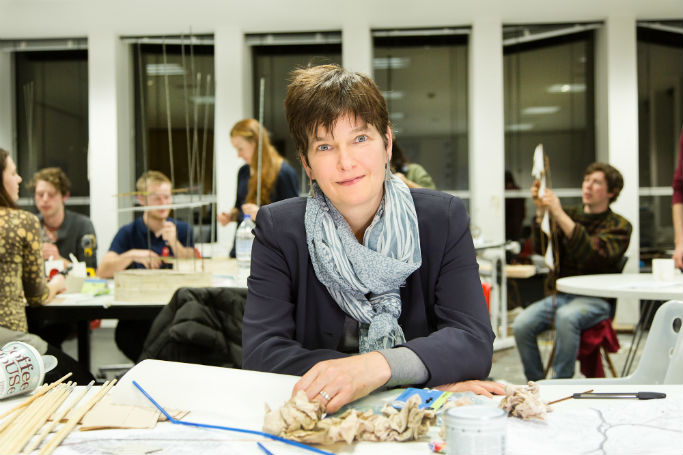Fionn was in practice for eight years, becoming a team director with the ASSIST Architects co-operative. Since then she has worked in academia and is now Head of School at the School of Architecture, The University of Sheffield. Fionn’s research and consultancy work focuses on developing innovative methods of building performance evaluation.

I was very young when I became aware of my ‘otherness’. I’m half German, so when I was in Germany I was seen as English and vice versa, which meant I was very familiar with feeling like an outsider. I remember going to primary school proudly wearing my traditional German leather trousers and getting called a Nazi. As a result I was a fairly politicised child who was sensitised to notions of difference, fairness and justice.
My German grandmother lost her husband just before the war, and was left to care for five children alone. She was Mother Courage – awful things happened but most of the family survived. After the war she decided to become a politician and fought tooth and nail to regenerate her part of the town, to deal with slums and get new buildings built. She was an early role model and showed me how powerful women can be on their own.
She was also a tremendous saver, having experienced extreme shortages. You’d open up one drawer and there would be a thousand elastic bands, open up another and there were lots of stamps carefully saved. It left me with a tremendous respect for resources - I’m very conscious that they are finite and you can’t make things out of thin air. I feel part of this planet and keenly aware of the need to preserve its fragile beauty. If you touch one thing it affects everything else.
Both my feminism and my anarchism enable me to challenge traditional ways of thinking. When I question the role of women and what constitutes a family, I can then consider the implications for design and the way space is used.
My time at Greenham Common reinforced this sense of interconnectedness, as well as evolving my identity as a feminist and a lesbian. It left me with a strong belief that women – and others who are not part of a dominant culture - need to work together and help each other. I remember when the Daily Express outed us over nine pages but it didn’t matter because we were part of a strong, supportive group who validated each other’s actions. It was such a contrast with being at school, where I felt I was the only one who was gay and I certainly didn’t talk about it.
I am an anarcho-syndicalist, which to me means taking full responsibility for my actions rather than abdicating my rights through a democratic process. Both my feminism and my anarchism enable me to challenge traditional ways of thinking. When I question the role of women and what constitutes a family, I can then consider the implications for design and the way space is used. On a personal level, I brought up twins with my ex-partner and I want my own experience to be represented in the way we think about architecture.
I’d like architecture to lose some of its ego. We need to come down off our pedestals, get into communities and get our hands dirty.
If you challenge gender stereotypes, the discussion naturally extends to encompass race, disability and other aspects of difference; it all starts to connect and becomes about culture. Implicit in feminist architecture is a way of working that promotes collaboration, is mindful of the user, values diversity and is intensely aware of the impact of what we do.
I’d like architecture to lose some of its ego. I fear that the public perceives architects as somewhat rarefied and distant and I have a problem with awards that reinforce the cult of the individual. We need to come down off our pedestals, get into communities and get our hands dirty. We also need to become more interdisciplinary in the way we think and work.
I believe that change comes through education, that’s why I’m in it. As a Head of School I think I have a responsibility to positively influence students’ attitudes and practice. Life is about give and take and if the world’s going to keep on working, there is an obligation to give back something now.









